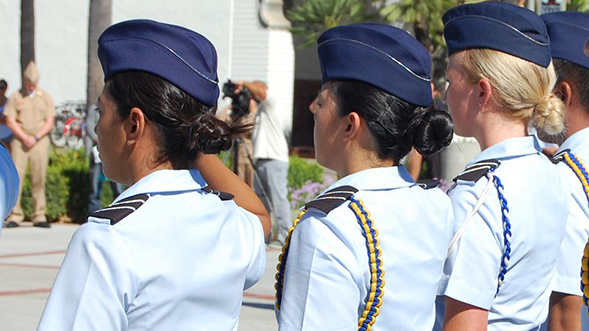Leading the Charge
A women veterans success program is on the horizon at SDSU.

Amanda Etter spent four years in the United States Marine Corps as an aviation supply specialist. “When we lost a $2 million-dollar rotor for a helicopter, I was the one researching where to find it,” she said. “I was the one getting those parts to Afghanistan when they needed them.”“I think such a program is a natural progression of an entire veterans center having a home at San Diego State.”
In other words, when something needs to be figured out, Etter is the one to contact. These days she spends time at San Diego State University’s Joan and Art Barron Veterans Center serving as an academic advisor through the Wounded Warrior Battalion-West.
Her work with wounded, ill and injured service members and their caregivers or family members is all about helping them achieve their educational objectives. Etter assists with educational planning, identifying available resources, outlining success strategies, and avoiding possible pitfalls.
Currently, her mission is to launch a women veterans success program on campus.
“I want to establish an opportunity to develop the full potential of women veterans,” she said.
The need
Etter sees a need. Other women veterans see it, too.Whether it is reflected in the reluctance of women veterans to seek healthcare through the Veterans Health Administration or their reticence to broach the subject of military sexual assault with their male counterparts, the difference in the post-military concerns of men and women veterans is real.
"Of course there's a need for a women veterans program because the issues females have are often unique from our male counterparts in the service,” said U.S. Army Major Michele Torne (’98), who recently retired after 18 years of military service.
Historically, the military was geared toward men, Torne pointed out, but as times have changed, so has the service. Over her nearly two decades in the U.S. Army, she said she began to notice improvements.
“The Department of Defense is moving toward programs geared toward women,” she said. “That’s nice to see because I really thought I wasn't going to see it in my lifetime.”
Still, she admits, changes to assist women veterans are arriving slowly.
Significant biases
At SDSU, 20 percent of military-affiliated students are women. That compares with approximately 15 percent of female personnel in active duty roles with the U.S. military.There is no question veterans of both sexes face many of the same challenges. But Etter points out that the social, financial and healthcare problems faced by all veterans have a higher frequency among women.
“The numbers show significant biases between males and females in the veteran community,” she said. “The unemployment rate is much higher for a woman veteran; the divorce rate is much higher for women veterans, so there are some disparities there that I want to address."
Natural progression
Leanne Babcock (’08) is familiar with the issue. A U.S. Air Force captain currently serving as an activated reservist, she is also involved with Final Salute Inc., an organization dedicated to providing homeless women veterans with safe and suitable housing.Babcock is currently one of 400 military women competing for the title of Ms. Veteran America 2017. The competition is designed to raise both awareness and funding for homeless women veterans, which the group’s website lists as the country’s fastest-growing homeless population. Over half of homeless women veterans, it reports, are also single mothers.
Babcock stresses the need for a women veterans success program that would link female student veterans to existing resources.
“Having a bridge at the Barron Center specifically for incoming women veterans would be extremely helpful,” she said. “I think such a program is a natural progression of an entire veterans center having a home at San Diego State.”
Pursuit of research
Etter plans to base her program on helping women student-veterans achieve academic, personal, and professional success. Working with the County of San Diego, she plans to launch her program at an October event she hopes will bring together at least 400 students, active duty military and alumni under a theme of “Passion and Perseverance.”The Marine Corps veteran said she believes a women veterans success program would also attract research on issues related to women veterans.
“There's just recently a lot more research being done within the student veteran population, but there's limited information about women student veterans, so that is something we are going to pursue,” Etter said. “SDSU will be at the forefront of veterans research.”



